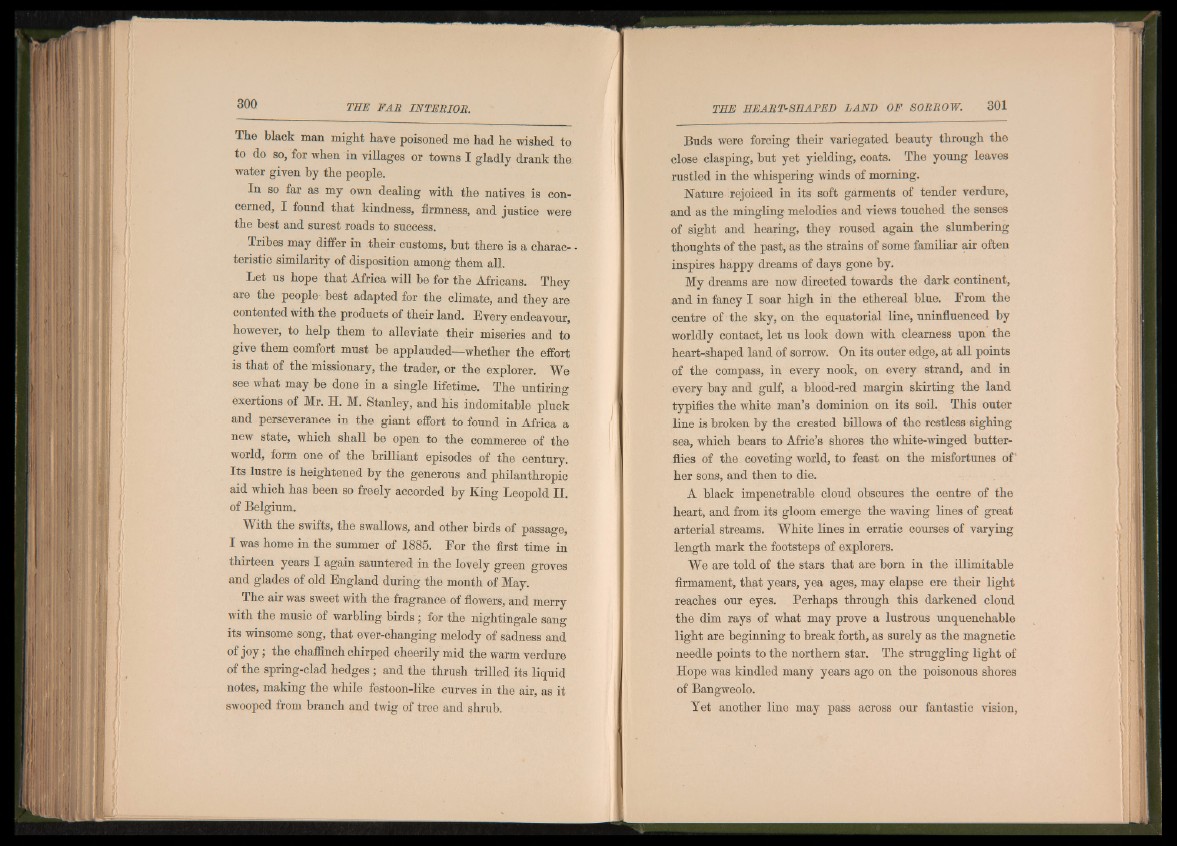
The black man might have poisoned me had he wished to
to do so, for when in villages or towns I gladly drank the
water given by the people.
In so far as my own dealing with the natives is concerned,
I found that kindness, firmness, and justice were
the best and surest roads to success.
Tribes may differ in their customs, but there is a charac- •
teristic similarity of disposition among them all.
Let us hope that Africa will be for the Africans. They
are the people best adapted for the climate, and they are
contented with the products of their land. Every endeavour,
however, to help them to alleviate their miseries and to
give them comfort must be applauded—whether the effort
is that of the missionary, the trader, or the explorer. We
see what may be done in a single lifetime. The untiring
exertions of Mr. H. M. Stanley, and his indomitable pluck
and perseverance in the giant effort to found in Africa a
new state, which shall be open to the commerce of the
world, form one of the brilliant episodes of the century.
Its lustre is heightened by the generous and philanthropic
aid which has been so freely accorded by King Leopold II.
of Belgium.
With the swifts, the swallows, and other birds of passage,
I was home in the summer of 1885. Eor the first time in
thirteen years I again sauntered in the lovely green groves
and glades of old England during the month of May.
The air was sweet with the fragrance of flowers, and merry
with the music of warbling birds ; for the nightingale sang
its winsome song, that ever-changing melody of sadness and
of joy j the chaffinch chirped cheerily mid the warm verdure
of the spring-clad hedges ; and the thrush trilled its liquid
notes, making the while festoon-like curves in the air, as it
swooped from branch and twig of tree and shrub.
Buds were forcing their variegated beauty through the
close clasping, but yet yielding, coats. The young leaves
rustled in the whispering winds of morning.
Nature rejoiced in its soft garments of tender verdure,
and as the mingling melodies and views touched the senses
of sight and hearing, they roused again the slumbering
thoughts of the past, as the strains of some familiar air often
inspires happy dreams of days gone by.
My dreams are now directed towards the dark continent,
and in fancy I soar high in the ethereal blue. From the
centre of the sky, on the equatorial line, uninfluenced by
worldly contact, let us look down with clearness upon the
heart-shaped land of sorrow. On its outer edge, at all points
of the compass, in every nook, on every strand, and in
every bay and gulf, a blood-red margin skirting the land
typifies the white man’s dominion on its soil. This outer
line is broken by the crested billows of the restless sighing
sea, which bears to Afric’s shores the white-winged butterflies
of the coveting world, to feast on the misfortunes of'
her sons, and then to die.
A black impenetrable cloud obscures the centre of the
heart, and from its gloom emerge the waving lines of great
arterial streams. White lines in erratic courses of varying
length mark the footsteps of explorers.
We are told of the stars that are born in the illimitable
firmament, that years, yea ages, may elapse ere their light
reaches our eyes. Perhaps through this darkened cloud
the dim rays of what may prove a lustrous unquenchable
light are beginning to break forth, as surely as the magnetic
needle points to the northern star. The struggling light of
Hope was kindled many years ago on the poisonous shores
of Bangweolo.
Yet another line may pass across our fantastic vision,